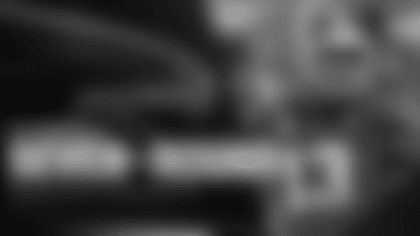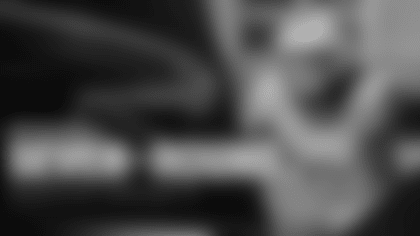It was hot in the way only early August in Georgia can be. Looking back, I didn't really mind.
It was the first open practice of the 2021 season. If I'm being honest, when I got up that morning to head to Flowery Branch, I was dragging. There's a different gear you have to find when covering training camp, and I had yet to make the shift.
But by the end of the day I had, and I think it was because I didn't know how much I missed this until I got it back…
Yes, this is about to be an ode to practice.
Some of you may know me already. Maybe I popped up on your Twitter feed at some point in the last year, but some of you may not. So, let me introduce myself: My name is Tori McElhaney. I started covering the Falcons for The Athletic right before the 2020 training camp began.
This was a goal achieved for me. When someone asked about my career aspirations when I was a 20-year-old at the University of Georgia, I always said I wanted to cover a professional beat for a national publication. I had accomplished that feat at 24 years old, but, I did so in the middle of a global pandemic. No one teaches you how to do that, and I faltered as much as I flew through it.
RELATED CONTENT:
The first few months on the beat were difficult. When it came to the team I covered, I didn't shake the first hand or see anyone in person until I had been on the beat for a full year. When the most important part of your job is the connections you make, not being able to make them causes you to reevaluate what you're doing.
Football – my job – had become monotonous.
That is, until that Saturday practice at the beginning of August, when I realized just how much I missed it.
Maybe it was seeing all of you, who came out that day to watch from the hill overlooking the Falcons practice fields in Flowery Branch. Maybe it was seeing these players fly around for a couple hours. Maybe it was finally getting to see this new coaching staff in action. I don't know exactly what it was. All I know is I felt a certain sense of contentment baking under the sun as I watched 7-on-7. I felt like I was finally where I was supposed to be.
That's when it really hit me: More than in any interview setting or even when I sit down to write, being on a sideline during practice is where I feel most comfortable.
I think that's because I am a byproduct of the parents who raised me. My mom is a middle school science teacher who grew up a competitive swimmer. Don't let her tiny stature fool you, any fire that I have in me comes from her. As for my dad, he was a high school football coach for the first 17 years of my life. So, growing up, if I didn't have a practice of my own that my mom took me to, I was out at practice with my dad.
Every day after school I would come to his office that overlooked the football field. Sometimes I would have homework and be stuck in the office during practice. That essentially boiled down to me looking out the window as players ran through drills.
I loved the game, but I didn't have the athletic ability to play it. There was also my gender, too. Unfortunately, in the world we live in, being a girl meant there was an immediate strike against my dream of playing in the NFL at age 9. But that didn't mean I loved the game any less. Maybe it meant I loved it more.
When I was younger, the weeks went by in a flash of routine: practice during the week, game on Friday and then my family would usually wake up on Saturday morning to go trade film with the following week's opposing coach. This was the late-90s and early 2000s, and trading film was still a thing. This usually meant breakfast at Cracker Barrel, so I was pleased. Every Saturday, I looked forward to new film, college football and a large plate of bacon.
As the years went on, football seeped into who I was. But, more than that, I found that I very much cared about the team itself. In elementary school, I dressed up as Dad's starting quarterback for Halloween. After every game, my mom, sisters and I would run down onto the field, high-fiving players and coaches as we went searching for my dad. I cared about the boys and men I saw on the field every day. And when you care, you want to know what happened and why it happened, even when looking on from afar.
At 25 years old, I still find that I enter into my job with a very similar mindset.
It's why – you'll know this if you've read any of my work over the last year – I tend to almost over-explain the "Why." Why did a player do this? Why did a coach make this call? Why is this roster move important and what does it mean for the salary cap? Why does this player care about this cause? Why? Why? Why?
When we know someone's "Why," we know their motives. If we know their motives, we get a glimpse into who they are, how they think and what they care about.
It has always been important to me to show readers that the men they watch on Sundays are people. It's so easy to see them in their headsets, jerseys and helmets and forget there's a person under there. Someone with family, friends, hopes, dreams, thoughts and ideas, that it's more than just a season's expectations carrying them forward.
I think being a coach's daughter instilled that in me at some point over the course of a lifetime of practices. Maybe it's why I find it so important to know the "Why" even on a hot and humid practice field. Perhaps especially on a hot and humid practice field, because one day that practice will turn into a game field and you'll want to know what got this team you care about where it is. I'll be there to help, telling compelling stories along the way.
So, yes, my goal in this role is to break down the "Why" in whatever capacity that is, day-in and day-out.
Maybe your question for me is now asking what my "Why" is for joining a team. Well, I guess it's just where I've always felt like I've belonged. I grew up on one after all.















